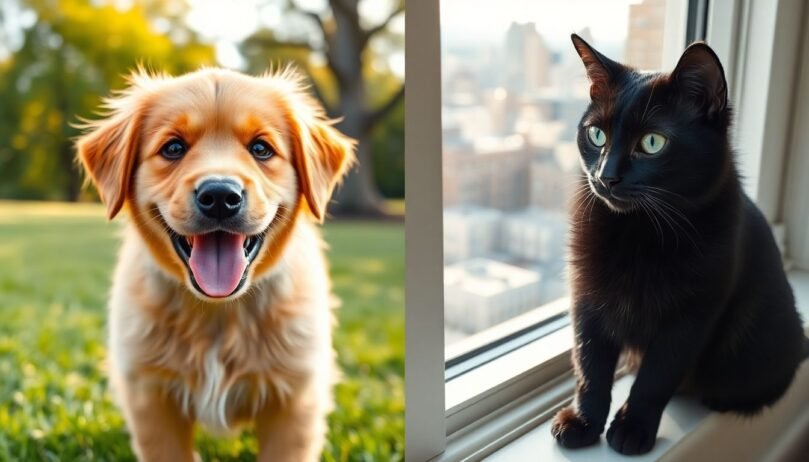How to Choose Between a Dog and a Cat
- 2 February 2025
- BuyAPet Editorial Team
- All Cats, All Dogs, Cat Health, Cats and Dogs, Dog Health
Dog vs. Cat: Which Pet Is Right for You?
The battle between dog lovers and cat enthusiasts is never-ending. Both pets have unique charm and qualities, making the choice personal and often challenging. Use this guide to compare lifestyle fit, costs, time commitment, and temperament—so you can bring home the companion that truly suits you.
The Great Pet Debate
Understanding the differences between dogs and cats can lead to a fulfilling relationship with your new furry friend. Below, you’ll find practical considerations to help you decide—no guilt, just clarity.
Quick Decision Guide
Activity & Time
- ✔ Love long walks, training, and outdoor time? Dog
- ✔ Prefer short play bursts and independence? Cat
- ⚠ Away 9–10 hours most days? Consider a Cat
Home & Space
- ✔ Apartment/urban: Cats adapt easily
- ✔ Garden/trails: Dogs thrive
- ⚠ Check rental pet policies first
Budget Snapshot
- Dogs: typically higher food & grooming
- Cats: modest litter/toy costs
- Plan for emergencies or insurance
The Allure of Canine Companionship
Dogs are known for their loyalty and companionship. They thrive on attention and enjoy being included in family activities.
Best If You Want…
- Daily exercise buddies and outdoor adventures
- Training, structure, and interactive play
- A highly social, by-your-side companion
Keep in Mind
- Time commitment for walks and socialization
- Often higher recurring costs (food, grooming)
- Pet-sitters/boarding may be needed for travel
- High-energy breeds: Border Collies, Retrievers thrive on activity
- Laid-back breeds: Bulldogs, Basset Hounds are more relaxed
Tip: choose temperament and energy match over looks to avoid mismatches.
The Enduring Appeal of Feline Friends
Cats are admired for independence and low-maintenance care. They can be affectionate but also enjoy alone time.
Best If You Want…
- Self-sufficient companions for busy schedules
- Apartment-friendly pets
- Quiet company and lap time (on their terms!)
Keep in Mind
- Litter box upkeep is essential
- Some cats dislike change and travel
- Still need daily enrichment and play
- Affectionate: Ragdolls, Maine Coons often seek companionship
- Independent: Varies widely—adult shelter cats show established traits
Tip: meet the cat and ask about routines, play style, and comfort with handling.
Making the Right Choice for Your Lifestyle
Activity Levels & Routine
- High energy: Dogs that match your pace are ideal
- Relaxed pace: Many cats fit naturally
- Work hours: Long days away favor cats
Space Requirements
- Urban living: Cats excel in small spaces
- Suburban homes: Dogs benefit from a yard
- Pet policies: Review deposits, size/breed rules
Financial Commitment: Costs of Pet Ownership
| Expense | Dogs | Cats |
|---|---|---|
| Adoption Fees | Usually higher than cats | Generally lower |
| Supplies (bed, toys, bowls) | Starter kit + leash/harness | Starter kit + litter box |
| Food | Often more, varies by size & breed | Less overall |
| Vet Care | Annual exams/vaccinations; consider insurance | Annual exams/vaccinations; consider insurance |
| Grooming | Higher for long-haired/double-coated breeds | Regular brushing; occasional pro grooming |
| Travel & Boarding | Often need sitter or boarding | Usually fine with check-ins |
| Unexpected Costs | Emergencies/illness—budget or insure | Emergencies/illness—budget or insure |
Be prepared for sudden expenses—an emergency fund or insurance can make all the difference.
Time Commitment: Daily Care and Attention
Dogs
- Daily exercise and enrichment
- Training and socialization
- Prevent boredom to reduce behavioural issues
Cats
- Short play sessions for stimulation
- Regular grooming (esp. long-haired breeds)
- Litter box hygiene—cleanliness is key
Balance pet care with work and social life. Be realistic about the time you can give daily.
Allergies and Living Situations
- Allergies: Dander and saliva can trigger symptoms. Meet pets first and consider low-shedding options.
- Apartment vs. House: Cats adapt well to flats; many medium/large dogs need more room.
- Pet Policies: Some rentals restrict breed/size or require deposits—check before adopting.
Your Perfect Pet Awaits
Choosing between a dog and a cat involves lifestyle, space, time, budget, and temperament. Understanding these helps ensure a harmonious match.
Next Steps: Researching Breeds and Shelters
- Visit local shelters and rescues—meet real pets and ask about temperament.
- Talk to staff about energy levels, routines, and compatibility with kids/other pets.
- Budget for first-month supplies and a new-pet vet visit.
- Set up your home before arrival (sleep spot, food area, enrichment).
FAQ
Are cats always lower maintenance than dogs?
Usually, but not always—kittens and some breeds need lots of playtime and grooming. Adult personality often matters more than species stereotypes.
What if I travel frequently?
Cats generally handle short trips with sitter check-ins. Dogs often need boarding or a dedicated sitter.
Which is better for kids?
Both can be wonderful. Focus on temperament, energy level, and the pet’s comfort with children—shelter staff can advise.
